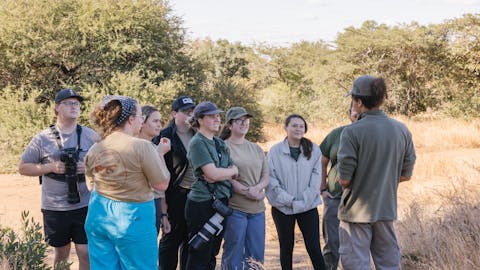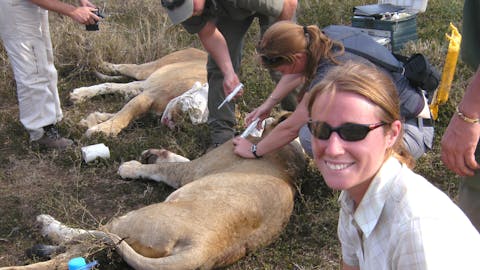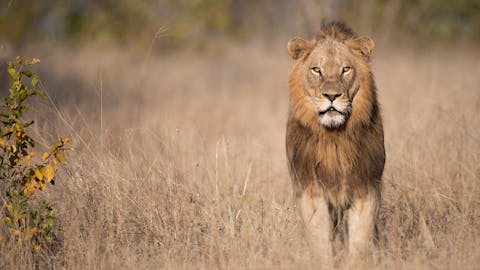Make it yours
Every experience is customised to be just right for you.
WILDLIFE VOLUNTEERING: THE RED FLAGS MOST PEOPLE MISS
Learn more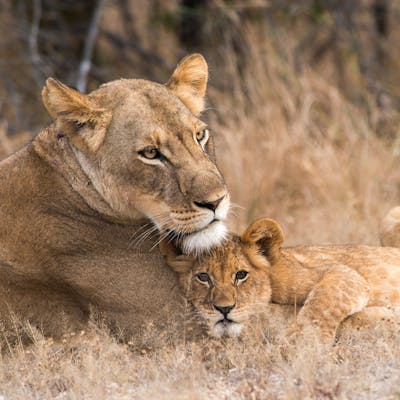
Come face to face with Africa’s alpha predator.
When you volunteer with lions in Africa with African Conservation Experience, you step into the world of genuine lion conservation. With lions increasingly threatened by habitat loss and unethical tourism practices, our experiences take you beyond a safari and into real conservation work that protects one of Africa’s most iconic predators.
Working alongside wildlife experts at one of our lion conservation projects, you’ll study lion behaviour in their natural habitat, support the care of injured lions in trusted sanctuaries, and learn about the major threats facing these animals - from canned hunting to cub exploitation. It’s a rare chance to witness lion conservation up close and contribute to efforts protecting a species still under pressure across Africa.
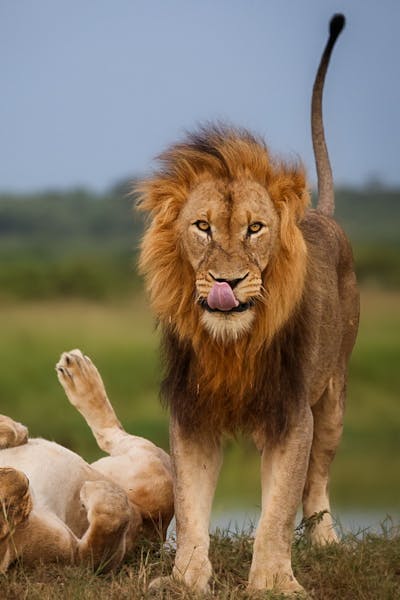
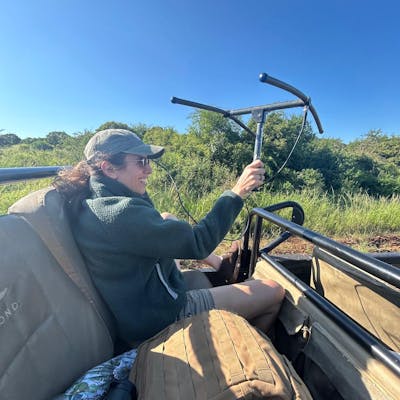
Explore how you can volunteer with lions in Africa.
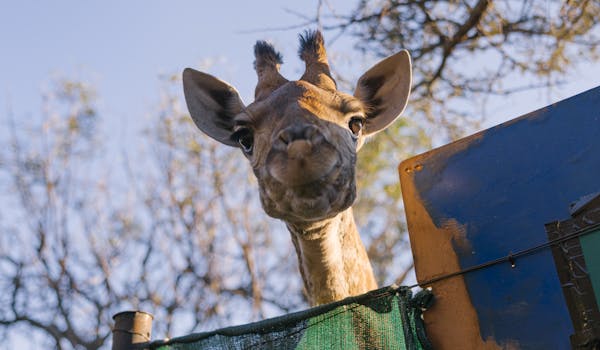
Help care for injured and endangered wildlife in a dedicated rehabilitation centre
View details for Moholoholo Wildlife Rehabilitation Centre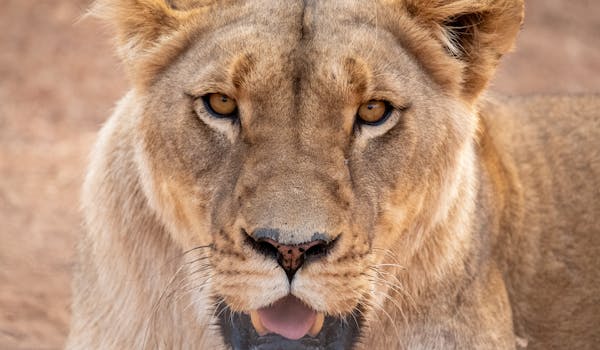
Join experts protecting rhinos and lions, in the wild and at a specialist sanctuary
View details for Shimongwe Wildlife Veterinary Expedition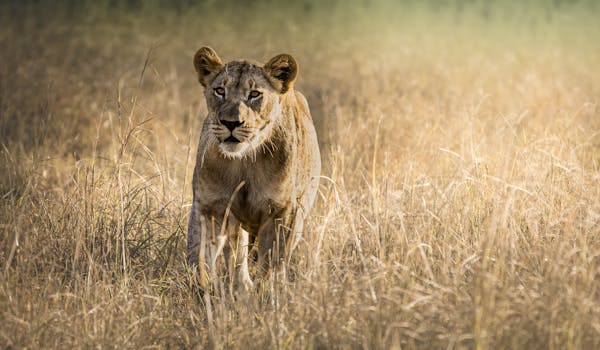
Go behind the scenes on a Big 5 reserve and join one of the biggest conservation success stories
View details for Phinda Wildlife Research Project
Go off the beaten track in a remote bush camp, and monitor lions, elephants and raptors
View details for Umsele Field Conservation Project - In Partnership With Balule & EWTClick the button to access your free guide. We've also sent it to your email.
Inside: the 8 red flags that reveal exploitation, the 10 green flags that prove genuine conservation, and the questions to ask before you book.
Download now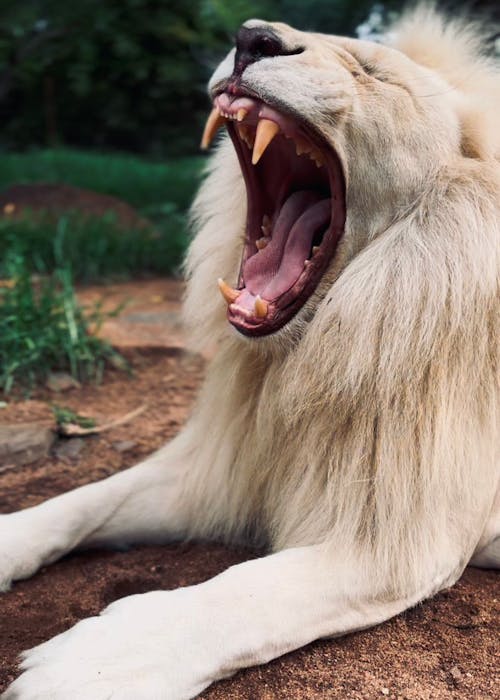
Photo taken by a volunteer of a male lion yawning
In 2015, the feature-length documentary Blood Lions brought millions of people’s attention to the cruel and all-too-brief lives of African lions bred in captivity. The film revealed what every conservationist working with lions already knows: the lion breeding industry is an animal rights travesty.
The industry exists primarily for the benefit of trophy hunters and the lion bone trade. Some breeding facilities also offer tourists the chance to have their photo taken cuddling a lion cub.
According to researchers working with lions, there are hundreds of breeding facilities in South Africa holding thousands of captive lions. This means a large percentage of South Africa’s lion population spend their lives in captivity.
Usually, such a large-scale breeding program would have at least some conservation merit. After all, many species are bred in captivity and then introduced into the wild. However, captive lions simply do not learn the huge number of complicated skills they require to survive in the wilderness. Complex pride structures are almost impossible to form unnaturally. This means breeding facilities can’t offer any support to real lion conservation projects, which work to ensure wild animals can survive in their natural habitats.
Historically, South Africa has exported the bones and other products of close to 1,000, which has accelerated the growth of the industry. As of 2019 this has been curtailed as a result of public outcry, and as of April 2024, the government of South Africa is seeking the closure of the captive breeding of lions in totality, and the export of all lion derivatives.
The word ‘hunting’ may suggest some form of pursuit is involved in this activity, but with canned lion hunting, this couldn’t be further from the truth. Instead, trophy hunters pay large sums of money to participate in a false hunt where they are praised for shooting a drugged lion that has been delivered to a particular spot for that exact purpose.
Conservationists working with lions in Africa are campaigning hard for this widespread barbarism to be made illegal. Even many hunting groups now agree it should be stopped on ethical grounds and because it lacks what they see as the sportsmanship of a wild hunt, where the lion has a small chance of escape. This is a rather warped logic, however, as wild lion hunting is, if anything, even more devastating than canned hunting and the goal should be to put a stop to all forms of lion hunting.
Despite calls for canned hunting to be banned, governments are reluctant to act, as this practice brings in many tourists to Africa every year and provides jobs for rural communities. In fact, the authorities have even helped rebrand canned hunting as ‘captive hunting’ to make it more appealing to trophy hunters. And this is just one of many efforts to legitimise the industry. Some supporters have tried to claim it takes pressure off wild lions or that canned hunting helps the conservation of lions by reintroducing captive lions into the wild. However, these arguments don’t stand up to the evidence. Demand for wild hunting licences hasn't decreased since canned hunting was introduced.
Many captive lion centres offer tourists the chance to cuddle up to a lion cub or the young of another carnivore species. While this may sound harmless enough, even heart-warming to some, sadly, it is just a way for canned hunting facilities to make money from lions before they’re old enough to be hunted or slaughtered for parts.
Young cubs are taken from their mothers in captivity and hand-reared. Then, once they reach maturity, they return to the lion farm where they’re either shot by a trophy hunter for money, used for breeding themselves, or killed for their derivatives.
Rather than revealing the unsavoury truth about their business, predator petting zoos tell tourists their cubs have been abandoned or rescued in the wild. Of course, this is very rarely true. Rescued lion cubs usually end up in a working sanctuary where they receive proper care, rather than a petting zoo where tourists queue up for their 20-minute cuddle. Centres that offer cub cuddling are not real lion conservation volunteer projects.
Lions are carnivores and will happily tuck into any animal they can get their claws on. As a volunteer working with lions in Africa, you’ll see their diet consists mostly of common local wildlife such as zebras, giraffes, buffalo and antelope.
Researchers working with lions in Africa have recorded them running as fast as 50mph (80km/h). However, while lions make excellent sprinters, they aren’t cut out for long-distance running and will give up the chase if they don’t catch their prey quickly.
A lioness will typically have between eight and 18 cubs in her lifetime. Once she reaches sexual maturity, which usually happens around age four, she can give birth to a new litter around every two years and each litter produces a variable number of cubs, seldom more than six. However, lion cub survival rate in the wild is only around 50%.
Well, the answer depends, as male lions often have more violent lives in the wild. Within the wild, the average lifespan of a male lion is between eight and 10 years, while lionesses often live longer, usually between 15 and 18 years.
Only male lions grow a mane, which should give you a clue as to its role - a long, healthy mane shows lionesses that a male lion has strong genes and has survived for many years, suggesting he could be a worthwhile mating partner. In addition to attracting lionesses, lion manes also intimidate rival male individuals.
A male lion will grow up to around 190kg (420lbs), whereas a lioness will usually be quite a lot smaller at around 130kg (280lbs).
Lions play a crucial role in maintaining healthy ecosystems, and getting involved as a lion conservation volunteer is a powerful way to support this balance. Lions help control populations of herbivores, preventing overgrazing and protecting plant life. By targeting the sick and weak, lions promote stronger, disease-resistant prey populations and support biodiversity. Their kills also provide food for scavengers like hyenas and vultures, sustaining a wider web of life. Because they require large, stable habitats, healthy lion populations are also a strong indicator of overall ecosystem health. By choosing a lion conservation experience, you help protect an apex predator and ensure that ecosystems remain intact and resilient.
We specialise in volunteering in southern Africa. We have lion projects in South Africa and lion volunteer programs in Botswana. Did you know, Botswana is home to two of the 10 remaining mega populations of African lion?
Our lion conservation volunteer projects are either hands-on research programs based in the field, giving you the opportunity to collect data on wild lion behaviour and movements, or initiatives against the cruelty towards captive lions.
Many unscrupulous lion and other large carnivore breeding and care centres are marketing themselves to big cat conservation volunteers under false pretences, with many of the cubs eventually ending up in the trophy hunting industry. They may claim to support the conservation of lions or have a team of scientists on-site, they may even claim to be releasing their lions back into the wild, but they can seldom prove this.
There are, however, a number of large carnivore centres that provide a sanctuary for animals that can never be released back into the wild. These centres only allow specific species to breed under strict conditions for clearly defined reasons, for example, to increase genetic diversity, and they never allow the breeding of lions. Animals rescued from exploitative centres often end up at one of these sanctuaries.
All of our partner animal rehabilitation centres strictly adhere to the animal welfare guidelines set by SATSA and ABTA. Additionally, we only partner with wildlife research projects in Africa that either maintain near self-sustaining animal populations or operate under a model we call "stewarded", where minimal human support helps ensure long-term viability. This commitment guarantees that animals live as naturally as possible while upholding the highest standards of care, conservation value, and ethical treatment.
For information on the topic of ethical lion conservation volunteering in Africa, please refer to our Animal Welfare page.
Take the first step on your roaring adventure by simply submitting an enquiry form. We offer opportunities to volunteer with lions for all experience levels and interests. You can find out more about how we take time to create a customised African Conservation Experience that’s just right for you here.
We can't wait to speak with you about the opportunities for volunteer work with lions in Africa!
